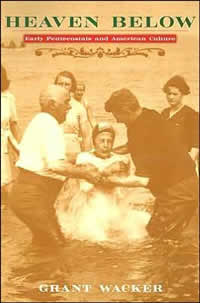Book Notes
 Heaven Below; Early Pentecostals and American Culture (Cambridge: Harvard University Press, 2001)
Heaven Below; Early Pentecostals and American Culture (Cambridge: Harvard University Press, 2001)
My sister speaks in tongues and so does her husband; they make me nervous. I have vague recollections as an immature teenage Christian of being schooled to speak in tongues, failing the test, and then feeling guilty that I was not as spiritual, as closely in tune with God as my tutors. But considered globally, as a non tongue-speaker, I will soon be in the Christian minority, if I am not already.
From obscure beginnings at Bethel Bible School in Topeka, Kansas in 1901, and at 312 Azusa Street in an industrial section of downtown Los Angeles in 1905, what is broadly known as charismatic or pentecostal Christianity has grown today to include some 525 million believers from virtually every denomination and country the world over. Apart from Catholics (and many Catholics are charismatic), they constitute the single largest distinct group of Christians, and they are getting larger. Social scientists predict that in fifty years they will number one billion believers.
Grant Wacker, professor of history at Duke University, grew up in a Pentecostal family and so brings to this volume the critical detachment of a scholar but also the empathy of the consummate insider. Heaven Below focuses on the earliest years of the movement, from 1900 to 1925. Wacker’s goal? “To rescue Pentecostals from the shadowy fate that EP Thompson once called (in another context), ‘the enormous condescension of posterity’” (p. 266).
Scholars have struggled to explain how such a wildly enthusiast, anti-intellectual, counter cultural and divisive movement could not only survive and flourish but explode. Wacker offers a very specific twofold thesis. Early Pentecostals did two things extremely well. They encouraged the primitive impulse of a deeply felt and experienced relationship with God, and then devised pragmatic ways to “bottle the lightening” without “stilling the fire or cracking the vessel.” They held emotional prayer meetings and built hospitals. They begged God for healing and founded colleges. They could be both credulous and shrewd.
The pentecostal movement now enjoys a burgeoning scholarly literature. Charismatics have been good for the church, and this new literature should be good for the movement.


